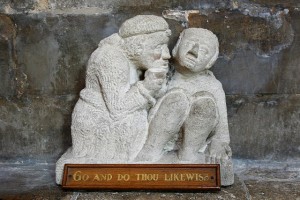 Today we have a guest post from Laura Compton on an act of service that has been in the news lately.
Today we have a guest post from Laura Compton on an act of service that has been in the news lately.
There’s been a lot of talk on the internet recently about the LDS practice of baptisms for
the dead. Reactions range from head-wagging disbelief to amazed puzzlement to anger and
frustration. Mormons don’t seem to understand why anyone would be offended at a gift given
in love and non-Mormons question why anyone would want to convert dead people, especially
people who died because of their religious heritage.
Mormons believe that the first step into the highest heaven is made through the waters
of baptism, and that baptism must be performed by an LDS priesthood holder. Since one
requirement of LDS baptism is that a person is buried — completely submerged — in water, it’s
necessary to have a body to submerge in order to do things properly. In Mormon cosmology, no
baptism means no exaltation.
Providing the gift of baptism on behalf of a deceased relative is also important to Mormons,
as their theology says that families will be able to live together eternally if they’ve received
the proper priesthood ordinances. Families will be linked via priesthood blessings and temple
ordinances which will allow parents to raise children who died young and which will allow
children to know parents, grandparents and other ancestors (and perhaps namesakes). Baptism is
the first step along this path to exaltation.
The idea of ordinances by proxy was a good answer to the religious question of what happens to
all the people who die without accepting Christ? Is it really fair or just for God to grant salvation
to a person who lived in a small town in Illinois in 1843, but to deny salvation to that person’s
deceased friends and family merely because those people were not in the right place or time to
benefit from the eternal-life-saving ordinances? Remember, Joseph Smith had seen many of his
family members, including half of his children, die before he shared any revelations about temple
work. Here was a way to bring the family back together and to provide much-needed solace
and comfort to so many members who’d left loved ones behind in Europe or the eastern United
States, or who continued to bury children at ages much too young. If God requires a specific
ordinance for exaltation, a just and merciful God would provide a way to offer that ordinance to
everyone — not just a chosen few.
If you love your family and want to be with them; if you find peace and comfort in knowing
that you might be, as my great-grandfather was promised, “the savior of your father’s house” by
seeking them out and doing temple work on their behalf, there’s a good chance you’d do a lot of
work to find a way to make sure you’re all together in the afterlife. You miss them now and want
to be with them later, so you find ways to make that happen.
At one point in time, the only people for whom temple work was being done were those people
who were known to proxies in some way. You took the family Bible off the shelf, dusted it off,
opened it up and copied down the names and dates of your aunts, uncles, cousins, grandparents,
siblings, etc. who’d passed on before you. You wrote letters to aged aunts living in The Old
Country. That was the low-hanging fruit, and it had personal meaning.
Now we have access to billions of records, nearly all of them strangers; many of whom have
never even heard of Joseph Smith or Thomas Monson. We gather information and bring
strangers’ names to the temples thinking we are doing good, believing we are giving a gift to
someone who is deceased. But that gift is not always understood. Indeed, sometimes that gift
hurts living, breathing human beings. If a gift harms someone, is it really a gift? Can we tell the
difference between bread and rocks, or do we need to read some parables again?
If I am doing something in good faith, with honor and integrity, it means I am first doing no
harm. As much as I would like to see everyone have the opportunity for exaltation, how much
should that exaltation cost? Do I purchase my own peace, comfort and satisfaction with the pain
of a grandchild or a spouse? Are the living more important than the dead? After all, the living
are here and now and are dealing with the consequences of my actions. The dead have a different
perspective on time and on life as I am living it. There ought to be no rush to get their temple
work checked off some list somewhere just because the name exists in a record or on a census.
Could I try to justify my actions and explain myself with trite expressions and phrases? “It’s
a gift.” “I’m not converting them, I’m giving them a choice.” “If you don’t believe the ritual
has meaning or power over the living, why are you concerned for the dead?” “Your ancestor is
deceased, why should it matter to you?” Yes, I could try to explain it away, but when I do that, I
am not building bridges or extending empathy. I am cutting people off, reminding them not that
I am a Christian trying to love others as myself, but that I am hell-bent on making the world see
and do things my way.
There are so many beautiful ways to provide service in the here and now. There are so many
ways to “succor the weak, lift up the hands which hang down and strengthen the feeble knees.”
There are so many who are hungry for food — both spiritual and physical. And there is at least
one millennium where everything will be sorted out. My house may have a savior in my great-
grandfather or in me. But that is *my* house. When *your* house needs saving, I will show you
how to find your ancestors and I will let you make the decisions about which gifts you would
like to give to them. For me to offer your ancestors that gift could well be stealing an opportunity
for you to create a salvific bond with them. And if we’re all going to live together in the Celestial
Kingdom, we’d better find a way to respect each other and get along here and now.
So tell me the stories of your loved ones, how they sacrificed for their beliefs, how they wanted
a better world for their children. I will tell you about my ancestors who sacrificed for their
beliefs and what their vision of a better world looked like. And maybe together we can repair the
foundations they began and continue to create a monument to all those on whose shoulders we
stand — all those watching us learn the lessons of embodiment and humanity. And when the time
comes for us to greet each other again, there will be love and understanding and joyous reunions
in many corners.

I think this is a really beautiful piece. So often, we can make the mistake of getting so caught up in trying to help people that we don’t realize that the help they need is different from the help we think they need. First of all, we need to listen and be aware. If we remember that acts of service are not about the giver, we could do some real good in the world, instead of needlessly hurting people. Meaning well has its limits.
Thank you, Laura. I remember as a teen, participating in this ‘service’ for the dead. It was the closest thing I’ve ever experienced to what I imagine is the gravity of mysticism. And I also remember puzzling over a process with such obvious shortcomings; the dead are countless and our records of names so brief. Of course, all such mysteries have promised resolutions. But still. If the dead anxiously await our service, then I’d pray that they have no sense of the eons of time required at this pace. And those countless whose names are lost to the ages — how they must suffer — all so the living can be blessed with an opportunity to serve them. The more I think about it, the less it seems like selfless service.
Explain to me how “I’m not converting them, I’m giving them a choice” is trite? It’s what LDS people believe, and it’s constantly what the media and many others out there lack the common courtesy and journalistic integrity to get right when reporting on this issue. It’s not trite to insist that they get this very important point correct. On the other hand, what isn’t trite is to point out the seething hatred directed toward LDS people on this issue, even after it’s correctly explained to them. Many of these people have so much hatred for Mormons and Mormonism that to even give their dead ancestors a choice whether to be one in the next life is to cause offense worthy of spit-soaked invective.
Jeremy Jones,
If that beautiful explanation didn’t work for you try….what if! We believe or hope that they are waiting for these ‘ordinances.’ But, what if, since they have been waiting this long already, they are willing to wait for one of their own to do the temple work for them? What if the dead are actually offended that we are not setting better examples for their living progenitors? Is it possible that our neighbors might be more inclined to choose Mormon Christianity if we weren’t so concerned about forcing ourselves on their dead, despite their wishes, in order to ‘give’ them this ‘service’ and ‘choice’ in the afterlife? I think we need to evaluate how much integrity and courtesy we are showing others by pursing an aggressive plan to perform ordinances in the names of their families. And, I would like to add, I think it is a lot easier to do genealogy work than it is to feed the hungry, visit the sick and love the hard-to-love.
Hinged,
Your post rests on the oft-repeated falsehood that baptism for the dead constitutes us “forcing ourselves on their dead.” It doesn’t. No matter how many times you say it, or in what flowery, “beautiful” way you explain it. It constitutes us saying a person’s name in a private ceremony that we don’t believe is efficacious without consent of the person involved. It has absolutely nothing to do with “integrity” and “courtesy” except for the lack of integrity and courtesy shown by those that distort what LDS people teach about baptism for the dead. If people object to this practice, they either do it on an emotional, irrational basis, they misunderstand what we teach, or they hate Mormons so much that they think that their dead relatives shouldn’t even have the choice to be Mormon in the afterlife.
It would be a bad thing if we did genealogy instead of feeding the hungry, visiting the sick, and loving the hard to love. But we don’t.